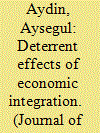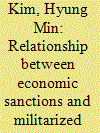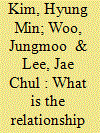| Srl | Item |
| 1 |
ID:
100387


|
|
|
|
|
| Publication |
2010.
|
| Summary/Abstract |
Economic interdependence and international conflict studies have traditionally focused on the role of bilateral trade on direct deterrence, mostly omitting its indirect effects on third-party states. While scholars in the extended deterrence literature have examined the role of defender-target trade in deterring aggressors, most empirical research has remained limited to immediate deterrence and neglected general deterrence. This article synthesizes these literatures and goes beyond the dyad-level analysis in trade-conflict studies by focusing on the deterrent effects of trade. I claim that trade ties between the defender and target are not sufficient for extended general deterrence. This is mainly because international trade by itself is a poor indicator of the extent to which the target is an economically important friend of the defender, worth defending against aggressors. Empirical analysis of militarized disputes between rival states in the post-1945 period supports this point and shows that extended deterrence success is most likely in cases where the defender and target are economically integrated through regional trade institutions as well as conducting heavy trade. Economically minded defenders can successfully generate credible signals of resolve if they have institutional ties with their important trade partners.
|
|
|
|
|
|
|
|
|
|
|
|
|
|
|
|
| 2 |
ID:
055217


|
|
|
| 3 |
ID:
172780


|
|
|
|
|
| Summary/Abstract |
This research empirically examines the relationship between economic sanctions and militarized conflicts for the period 1945–2001. The collective security principles of the League of Nations (after WWI) and the United Nations (after WWII) are based on the sequential imposition of economic and militarized sanctions against states that violate international rules and regulations. A recent example is the international sanctions imposed on North Korea in response to its nuclear weapons testing and ballistic missile development. Theoretical arguments in the field of international relations suggest that economic sanctions lead to militarized tensions and conflicts among states. In this research, we argue that the relationship between economic sanctions and military conflict is two-way (i.e. sanctions cause conflict, and conflict causes sanctions) rather than one-way. Using sanctions data (Threat and Imposition of Sanctions v4.0) and conflict data (Correlates of War Militarized Interstate Disputes v4.2; International Crisis Behavior v12), we find that the relationship is mutually causative. The involvement of economic sanctions causes the onset of militarized conflict, and vice versa.
|
|
|
|
|
|
|
|
|
|
|
|
|
|
|
|
| 4 |
ID:
174829


|
|
|
|
|
| Summary/Abstract |
Despite the importance of alliances in international politics, little is known about how they theoretically and empirically affect militarized conflicts and vice versa. This study aims to examine the reciprocal relationship between alliances and militarized conflicts. The literature has focused only on the effects of alliances on militarized conflicts without paying much attention to the simultaneous causation between them. Thus, previous studies have not consistently revealed a relationship between alliances and conflict. Moreover, they are limited due to the use of dichotomous measures of shared alliance ties. Using a continuous measure of alliance ties, this study clearly demonstrates that shared alliance ties can be effective in reducing the likelihood of militarized conflicts. In addition, this study finds that there is a reciprocal relationship between shared alliances and militarized conflicts. It finds that militarized conflicts tend to decrease the level of shared alliance ties. Then, this study argues that alliance might be added to the next element behind the Kantian tripod as a salient factor that reduces militarized conflict. Finally, this study points to insights to be gained from the findings and suggests some policy implications.
|
|
|
|
|
|
|
|
|
|
|
|
|
|
|
|